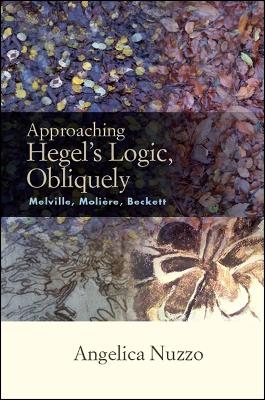
Approaching Hegel's Logic, Obliquely
State University of New York Press (Verlag)
978-1-4384-7204-1 (ISBN)
Winner of the 2020 Hegelpd-Prize presented by the University of Padova Research Group
In this book, Angelica Nuzzo proposes a reading of Hegel's Logic as "logic of transformation" and "logic of action," and supports this thesis by looking to works of literature and history as exemplary of Hegel's argument and method. By examining Melville's Billy Budd, Molière's Tartuffe, Beckett's Endgame, Elizabeth Bishop's and Giacomo Leopardi's late poetry along with Thucydides' History in this way, Nuzzo finds an unprecedented and productive way to render Hegel's Logic alive and engaging. She argues that Melville's Billy Budd is the most successful embodiment of the abstract movement of thinking presented in Hegel's Logic, connecting Billy Budd's stutter to the puzzlingly inarticulate beginning of Hegel's Logic, "Being, pure Being," identical with "Nothing," and argues that the Logic serves as an especially appropriate tool for understanding the sudden violent action that strikes Claggart dead. Through these and other readings, Nuzzo finds a fresh way to address interpretive issues that have remained unresolved for almost two centuries in Hegel scholarship, and also presents well-known works of literature in an entirely new light. This account of Hegel's Logic is framed by the need for an interpretive tool able to orient our understanding of the contemporary world as mired in an unprecedented global crisis. How can the story of our historical present-the tragedy or the comedy we all play parts in-be told? What is the inner logic of our changing world?
Angelica Nuzzo is Professor of Philosophy at the Graduate Center and Brooklyn College, City University of New York. She is the author of Memory, History, Justice in Hegel and the editor of Hegel on Religion and Politics, also published by SUNY Press.
Acknowledgments
Introduction: Thinking Transformation
Part I. Hegel’s Logic of Transformation
1. Thinking in Times of Crisis: Hegel’s Logic of Transformation
Prelude: After the Crisis, Telling the Story
1. From Today’s Present to Hegel’s Logic as a Logic of Transformative Processes
2. Another Crisis: Times of Change and Hegel’s Dialectic
3. The "Need" for a Logic of Change
4. Dialectic Is Movement: Zeno’s Arrow and Heraclitus’s Flux
5. Dialectic-Speculative Logic: Understanding and the Power of Reason
6. Hegel’s Dialectic-Speculative Logic: The Path for a Reconstruction
2. From the Beginning to the End: What Is Method?
1. The Nature of the Process: Determinate Negation and Immanence
2. Logical Movement and Logical Action
3. Method as the Enactment of Truth: Method Is Mythos
4. Method: Beginning, Advancing, and Ending the Logical Action
5. In the End Is the (Beginning of the) Story
3. Forms and Figures
1. Logical Action and Logical Agents
2. Phenomenological and Logical Gestaltung: Logical Forms as "Figures"
3. Logical Figures: Reality in the "Realm of Shadows"
Part II. Structures of Action: Logic and Literature
4. Beginnings
Some Preliminary Remarks: The Synchronic Perspective, or Reading the Logic All Over Again
1. Logical Beginnings: The Two Perspectives
1.1. Enacting the Absolute Beginning: The Figure of Beginning in Being
1.2. The Memory of the Beginning or Beginning-Again: The Figure of Beginning in Essence
1.3. The Beginning of Freedom: The Figure of Beginning in the Concept
2. Violence in the Beginning: Melville’s Billy Budd
2.1. The Logic of Violence: The Violence of Pure Immediacy—Being
2.2. The Logic of Violence: Violence Reflected
2.3. The Logic of Violence: The Violence of Power and the Power of Love
3. Transforming the Beginning
5. Advancing: Transformations
Advancing—the Question
1. Logical Advancements: The Two Perspectives
1.1. Advancing Being: Acting in Search of Determination, or Dasein
1.2. Advancing Essence: Acting in/as the Middle by Returning Back to Oneself, or Gesetztsein
1.3. Advancing the Concept, by Judging: Crisis and Stasis
2. Advancing Beyond Fanaticism: Molière’s Tartuffe
2.1. The Logic of Fanaticism: Advancing Despite Oneself—The Absolutism of Being or Moral Conscience
2.2. The Logic of Fanaticism: Advancing Despite Oneself—The Hypocrisy of Essence
2.3. The Logic of Fanaticism: Advancing Through the Crisis—Judging
3. Transforming the Advancement
Appendix: "Living in the Interregnum"
6. Endings
1. Logical Endings: The Two Perspectives
1.1. Ending Being, an Infinite Postponement: Going Back by Becoming Essence
1.2. Ending Essence: Reclaiming One’s Own End (Before and Against the Concept)
1.3. The Idea, Ending: Knowing When to Stop
2. Part I. Playing the Endgame: Indifference and the Impossible Ending—Beckett’s Endgame
2. Part II. Indifference, Repetition, and Liberation: Leopardi and Bishop
2.1. The Logic of Indifference: Being Indifferent to the End
2.2. The Logic of Indifference: The Absolute of Essence and the End of All Things
2.3. The Logic of Creativity: Ending Beyond the End (of the Idea)
3. Transforming the End
Ending—As in Concluding
General Appendix
Notes
Bibliography
Index of Names and Works
| Erscheinungsdatum | 22.07.2019 |
|---|---|
| Reihe/Serie | SUNY series, Intersections: Philosophy and Critical Theory |
| Verlagsort | Albany, NY |
| Sprache | englisch |
| Maße | 152 x 229 mm |
| Themenwelt | Geisteswissenschaften ► Philosophie ► Logik |
| Geisteswissenschaften ► Sprach- / Literaturwissenschaft ► Anglistik / Amerikanistik | |
| Geisteswissenschaften ► Sprach- / Literaturwissenschaft ► Literaturwissenschaft | |
| ISBN-10 | 1-4384-7204-8 / 1438472048 |
| ISBN-13 | 978-1-4384-7204-1 / 9781438472041 |
| Zustand | Neuware |
| Informationen gemäß Produktsicherheitsverordnung (GPSR) | |
| Haben Sie eine Frage zum Produkt? |
aus dem Bereich


